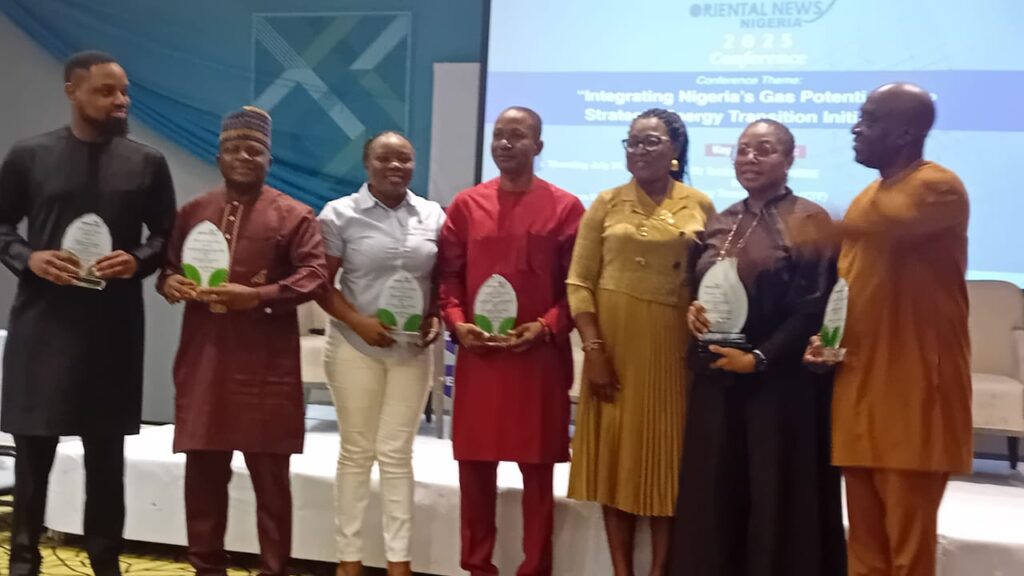Manager, Energy Transition at the Nigeria LNG Limited (NLNG), Mr. Temitope Ogendengbe, has disclosed that Nigeria has earned over $100 billion in revenue from natural gas at various times, underscoring gas as a critical resource for national growth, energy stability, and economic development.
Speaking at the Oriental News Nigeria 2025 Conference in Lagos, themed “Integrating Nigeria’s Gas Potential into Strategic Energy Transition Initiatives,” Ogendengbe stressed the central role of gas in Nigeria’s journey toward a sustainable energy future.
Ogendengbe decried the fact that over 100 million Nigerians still rely on polluting fuels for cooking, which he said contributes to serious health and environmental challenges.
“Energy transition has become a buzzword in recent years, but it’s not new,” he said. “It has always been a societal evolution, moving from one source of energy to a more efficient one that delivers higher productivity. That should be our mindset as we think about transition.”
He emphasized the environmental implications of carbon emissions and how income is now being derived from carbon trading and emissions mitigation globally. He noted that Nigeria must seize the opportunity presented by gas, both to drive development and position itself strategically in the global energy space.
“In Nigeria, we must see gas as a national opportunity. It’s our bridge to the future. We must use gas to build the nation. How we choose to leverage this resource will define our progress,” he said.
Recounting the nation’s energy history, Ogendengbe stated, “In the late ’80s, Nigeria was producing about two billion barrels of oil and 150 million standard cubic feet of gas daily. A lot of that gas was flared. But with foresight and collaboration, we turned a wasted resource into a $100 billion success story.”
He noted that although the global energy landscape is shifting rapidly particularly with increasing funding toward renewables Africa, and especially Nigeria, faces a unique challenge.
“Globally, over $2 billion was invested in renewables last year. But Africa contributes only 4% to global emissions and still suffers severe energy poverty. Jumping directly from fossil fuels to renewables isn’t feasible for us. That’s why gas must be a critical part of our transition,” he said.
Ogendengbe added that while Nigeria has committed to net-zero targets, created the Climate Act, and launched the Energy Transition Plan, these efforts must align with local realities to succeed.
The convener of the conference, Mrs. Yemisi Izuora, publisher of Oriental News Nigeria Online, said the summit was designed to support federal energy transition initiatives.
She highlighted the critical role of gas in powering homes, transportation (through CNG), and electricity, but lamented that gas remains inaccessible and unaffordable for many in rural areas.
“Gas remains very expensive in the villages. Women still use charcoal, which is hazardous. Government needs to license more producers and reduce the cost. Education campaigns must extend beyond urban centers into rural communities,” she said.
Izuora stressed the need for deeper public sensitization, particularly among women, to promote the use of clean energy like Liquefied Petroleum Gas (LPG).
Mr. Ehime Joseph, who represented the President of the Petroleum Products Retail Outlet Owners Association of Nigeria (PETROAN), Mr. Billy Gills-Harry, called for stronger partnerships with agencies like NLNG and REA to enhance gas distribution and infrastructure nationwide.
He said PETROAN members, spread across the country, are eager to partner and expand the gas economy but require strategic engagement.
Comptroller-General of the Nigeria Customs Service (NCS), Bashir Adewale Adeniyi, represented by PRO of the Federal Operations Unit, Zone A, Mr. Hussain Abdullahi, reaffirmed the agency’s commitment to curbing fuel smuggling, which undermines national energy security.
He cited “Operation Wild Wind,” a recent initiative that intercepted over 5,000 litres of fuel smuggled along the Badagry axis. The NCS, he added, exceeded its revenue target in 2024, generating over ₦1.6 trillion.
Director-General of the National Emergency Management Agency (NEMA), Zubaida Umar, represented by the agency’s Head of Press, Mr. Manzo Ezekiel, highlighted NEMA’s role in alerting sectors, including energy, about environmental threats.
She said the agency is enhancing early-warning systems and disaster simulations in anticipation of climate risks projected by NiMet and the Nigerian Hydrological Services Agency.
President of the Guild of Corporate Online Publishers (GOCOP), Maureen Chibu, emphasized the disproportionate impact of energy poverty on women, urging quicker adoption of clean energy alternatives.
“Globally, 2.3 billion people suffer from energy poverty, with women and children the most affected. We must explore urgent solutions to fast-track energy transition for the sake of vulnerable communities,” she said.















